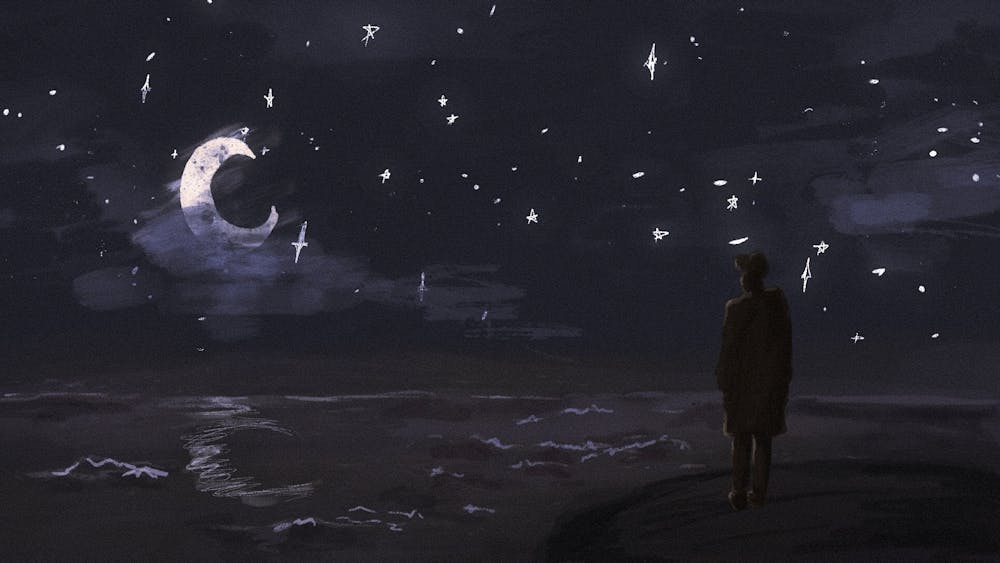“What do your parents do?” someone seriously asked me during Wharton orientation. Fighting my brain's battle between an unforced desire to share and an aversion to the anticipated awkward look, I recognized that I would face a long, interminable moment of apnea trying to explain to the world that I do not have two parents because my dad died. Grief exists, and at Penn, it isolates.
To be clear, I do not intend to be a prophet speaking universal truths because loss looks different for everyone, but I hope you will find truth in my words nonetheless. Death is a sensitive topic, not the least because it intertwines with cultural, religious, spiritual, and socioeconomic aspects of our identity. Yet grief is undeniably omnipresent, and Penn is no exception, meaning I am not the first one to write (or talk) about it, nor will I be the last, unfortunately.
Almost 40% of college students have lost a family member or close friend within the last two years. Considering there are 18.58 million college students, that makes us more than 7 million grievers. I guess we are not a minority, are we?
Wharton senior Pranavi Karnati lost her father last December after a battle with glioblastoma. She bravely watched him suffer for more than a year and a half, but “despite the pain he felt, he always managed to make us smile.” She experienced a slower, anticipatory death and described her grief as “isolating.”
There is no definitively designated place to grieve at Penn. Yes, Student Health and Counseling helps (if you are lucky), but 61% of college counselors in the United States report feeling “somewhat, little, or not comfortable at all” with supporting students primarily on grief. Unlike peer institutions like Princeton that offer grief-focused support groups, Penn lacks such infrastructure. The only comparable program that existed was Actively Move Forward, but it has been inactive since 2019.
What about Philadelphia-based groups? As Karnati shared, before you even get a chance to talk about grief, you may face an identity crisis. “There are groups for children and groups for adults. What am I? Where are college students supposed to sign up?”
The result explains why grief feels isolating. Naturally, some prefer to process on their own, but sooner or later, we crave feeling less like an alien and more like we are not the only ones experiencing excruciating pain. And support groups are one easy way to find others who relate.
Of course, this is only half the problem. Remember, I believe Penn is a detached elite. Having two parents is a privilege: emotionally but interestingly also economically, and substantially so. I cannot blame you for having a privilege you did not choose, but I can and will invite you to reflect on it.
SEE MORE FROM FRANCESCO SALAMONE:
After Karnati posted her terrible news, she received several supportive messages: “Lmk if you need anything” stood out. She mentioned, “My loss is making me realize who my true friends really are.”
Can Penn students only support one another through hasty texts with cheap acronyms?
We know your “I’m here if you need me” is well-intentioned, but understand that it creates a dilemma by putting the onus of starting the conversation on us, inadvertently burdening the griever even more. The individualistically expeditious culture of Penn is inevitably in direct contrast to the prolonged nonlinear path that grievers experience. At best, Penn students are awkwardly unequipped to support a grieving friend and at worst, fundamentally incapable of slowing down to care and empathize. You can do better.
Like what? Be present with your friend’s pain, listen with the heart, respect disordered confusion, and discover the gifts of sacred silence over filling words. That is what grief counselor Dr. Alan Wolfelt calls companioning. I wish my friends knew about companionship to ask me about my dad. Ask me what he was like, what he liked to do, what his quirks were. God, just ask me what his name was. When you ask, you are not reminding me that he died (trust me, I know), you are letting me know that you acknowledge that he lived.
The truth is I cannot blame them. Part of the matter is institutional and part of it is cultural: Many of us are used to the high school familiarity of knowing at least some family members of our friends. For better or for worse, in college, you are nothing more to others than what you present. And unlike your Canada Goose, you cannot wear your invisible grief when you walk down Locust. What you can wear is a Penn Face and pretend no one died, even with your closest friends, because it is profoundly easier and more tempting than the unfathomable truth.
So please, I beg you, next time you come across a griever, think twice before ending the conversation out of discomfort or sending the “I’m here if you need me” text. Think beyond and think deeper. Perhaps take the simplest approach: Sit down with them and see where they will bring you.
If we collectively accept death as a mainstream topic of social dialogue, grief will be easier to handle than to hide. Harvard professor and happiness expert Arthur Brooks says: “Grief does not have to be a private misery and net harm to our lives. We can learn to comprehend it, manage it, and grow from it. And in understanding our own grief, we can help others heal and thrive as well.”
After seven years, I understand my grief, and it is my hope (and Karnati’s recent hope) that these words will help somebody.
FRANCESCO SALAMONE is a Wharton sophomore from Palermo, Italy. His email address is frasala@wharton.upenn.edu









